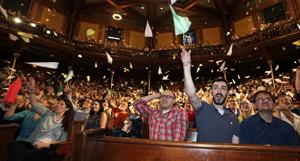Top Stories
Researchers Win Ig Nobel Prize for Studying Cow Stripe Effects

A team of researchers from Japan has garnered attention by investigating whether painting cows with zebra-like stripes can deter flies from biting them. This unconventional study, alongside other humorous scientific inquiries, earned them the prestigious Ig Nobel Prize during a ceremony held at Boston University on September 28, 2023. The Ig Nobel Prizes, awarded for unusual and comical scientific achievements, celebrate research that prompts laughter and reflection.
The Japanese team, led by Tomoki Kojima, conducted experiments by applying tape to Japanese beef cows and spray painting them with white stripes. Their findings suggested that the cows experienced fewer fly bites and appeared less irritated by the insects. “When I did this experiment, I hoped that I would win the Ig Nobel. It’s my dream. Unbelievable. Just unbelievable,” said Kojima, who donned striped attire during the event, adding a playful touch to his presentation.
The ceremony, organized by the Annals of Improbable Research, featured a range of humorous presentations. The winners were each awarded a handcrafted model of a human stomach and a single hand wipe, emphasizing the light-hearted nature of the event. According to Marc Abrahams, the master of ceremonies, “Every great discovery ever, at first glance seemed screwy and laughable. The same is true of every worthless discovery.” His words highlight the spirit of the Ig Nobel Prizes, which honor both absurd and meaningful scientific exploration.
Celebrating Whimsical Research
The 35th annual ceremony celebrated winners across ten categories. Among them were researchers from Europe who discovered that consuming alcohol could enhance a person’s ability to speak a foreign language. Another winner, who studied fingernail growth for decades, added to the eclectic mix of research that characterized the event.
The night’s entertainment included a mini-opera about gastroenterologists, inspired by this year’s theme of digestion. Attendees were treated to musical numbers discussing the challenges of treating stomach ailments, lightening the mood with humor. The audience also participated in a tradition of throwing paper airplanes at the stage, creating an atmosphere of playful celebration.
The event featured a segment called the “24-second lecture,” where top researchers succinctly explained their work in under half a minute. Among them was Gus Rancatore, who humorously licked an ice cream cone while repeatedly expressing his enjoyment. In another engaging presentation, Trisha Pasricha discussed the potential risks of using smartphones while in the toilet, linking it to concerns about hemorrhoids.
When presentations stretched too long, a man dressed in a formal suit with a dress over it humorously interrupted to exclaim, “Please stop. I’m bored,” adding to the comedic atmosphere that permeated the evening.
International Research Highlights
Other notable winners included a group from India that examined the impact of foul-smelling shoes on the user experience of shoe racks, and researchers from the United States and Israel who explored whether consuming Teflon could increase food volume. Additionally, a team of international scientists studied the effects of alcohol on bats, finding that intoxicated bats struggled with flying and echolocation when exposed to fermented fruit.
“It’s a great honor for us,” said Francisco Sanchez, one of the researchers involved in the bat study. “You can see that scientists are not really square and super serious and can have some fun while showing interesting science.” Sanchez explained that their research revealed bats did not prefer rotten fruit, which may contribute to their impaired flying abilities when consuming it.
In a particularly engaging moment, a team of researchers studying the physics of pasta sauce brought comedic flair to the ceremony. One researcher donned a chef’s outfit while another dressed as a large ball of mozzarella, humorously interacting with props as they accepted their award. They even distributed bowls of pasta to the Nobel laureates, blending food and science in a delightful manner.
The Ig Nobel Prizes continue to shine a light on the lighter side of scientific inquiry, reminding us that even the most unconventional research can spark joy and provoke thought.
-

 Lifestyle3 months ago
Lifestyle3 months agoLibraries Challenge Rising E-Book Costs Amid Growing Demand
-

 Sports3 months ago
Sports3 months agoTyreek Hill Responds to Tua Tagovailoa’s Comments on Team Dynamics
-

 Sports3 months ago
Sports3 months agoLiverpool Secures Agreement to Sign Young Striker Will Wright
-

 Lifestyle3 months ago
Lifestyle3 months agoSave Your Split Tomatoes: Expert Tips for Gardeners
-

 Lifestyle3 months ago
Lifestyle3 months agoPrincess Beatrice’s Daughter Athena Joins Siblings at London Parade
-

 World3 months ago
World3 months agoWinter Storms Lash New South Wales with Snow, Flood Risks
-

 Science3 months ago
Science3 months agoTrump Administration Moves to Repeal Key Climate Regulation
-

 Science2 months ago
Science2 months agoSan Francisco Hosts Unique Contest to Identify “Performative Males”
-

 Business3 months ago
Business3 months agoSoFi Technologies Shares Slip 2% Following Insider Stock Sale
-

 Science3 months ago
Science3 months agoNew Tool Reveals Link Between Horse Coat Condition and Parasites
-

 Sports3 months ago
Sports3 months agoElon Musk Sculpture Travels From Utah to Yosemite National Park
-

 Science3 months ago
Science3 months agoNew Study Confirms Humans Transported Stonehenge Bluestones









